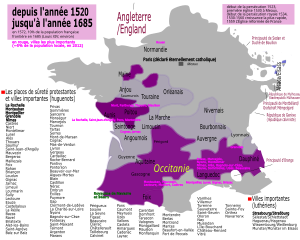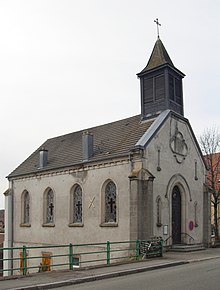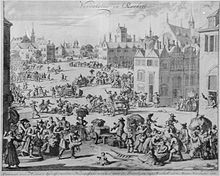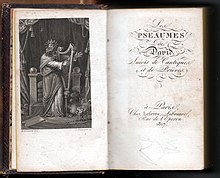
Religion in France 2017 (Pew Research Center)
Catholicism (44%) Protestantism (3%) Other Christian (1%) Irreligion (45%) Other/don't know/refused (7%)Protestantism in France has existed in its various forms, starting with Calvinism and Lutheranism since the Protestant Reformation. John Calvin was a Frenchman, as were numerous other Protestant Reformers including William Farel, Pierre Viret and Theodore Beza, who was Calvin's successor in Geneva. Peter Waldo (Pierre Vaudes/de Vaux) was a merchant from Lyon, who founded a pre-Protestant group, the Waldensians. Martin Bucer was born a German in Alsace, which historically belonged to the Holy Roman Empire, but now belongs to France.
Hans J. Hillerbrand in his Encyclopedia of Protestantism claims the Huguenots reached as much as 15% of the French population on the eve of the St. Bartholomew's Day massacre, declining to 10-12% by the end of the 16th century, and further after heavy persecution began once again with the revocation of the Edict of Nantes by Louis XIV.
Protestants were granted a degree of religious freedom following the Edict of Nantes, but it ceased with the Edict of Fontainebleau. The Protestant minority was persecuted, and a majority of Huguenots fled the country, leaving isolated communities like the one in the Cevennes region, which survives to this day.
According to a 2020 survey, Protestants made up 3% of the French population. A renewed interest in Protestantism has been brought by numerous Evangelical Protestants, while the membership of Calvinist and Lutheran churches has stagnated; many of the latter two confessions have merged into the United Protestant Church of France.
Major groups

Waldensians
Main article: WaldensiansA Christian sect or movement, sometimes characterized as proto-Protestant, organized around the teachings of Peter Waldo, a wealthy merchant of Lyon who lived in the 12th century. The Waldensians later moved to Northern Italy, where they experienced near decimation from Catholic authorities until the Reformation, when they affiliated with the Calvinists and other Reformed Christian groups of Switzerland, Germany and France. In the Duchy of Savoy, the Waldensians frequently faced persecution when "Sun King" Louis XIV of France put the dukes under pressure to eradicate all Protestant presence across his borders during the Savoyard–Waldensian wars (1655–1690). The group still exists in Italy, Germany, Brazil and the United States.
Huguenots
Main article: HuguenotsThe Huguenots of the Reformed Church of France were followers of John Calvin, and became the major Protestant sect in France. A large portion of the population died in massacres or were deported from French territory following the Revocation of the Edict of Nantes in 1685. Today, the Huguenots number about one million, or about two percent of the population; They are most concentrated in southeastern France and the Cévennes region in the south. The Calvinist congregations in Alsace and Moselle are organised as the Protestant Reformed Church of Alsace and Lorraine (EPRAL).
Lutherans
Main article: Lutherans
Lutherans formed a minority among the overall French Protestants. Their congregations were strengthened by Lutheran immigrants, mostly settling in economically prosperous places. With the French conquest of German-speaking regions along the Rhine beginning in the 17th century, the Kingdom acquired significant Lutheran populations. Under Napoleonic religious legislation of 1801 and 1802 also French Lutheranism was reorganized forming the Église de la Confession d'Augsbourg de France, established as a nationwide synod and body. It renamed as Evangelical Lutheran Church of France in 1906. In 1872, the Protestant Church of Augsburg Confession of Alsace and Lorraine (EPCAAL) had branched off, competent since for most Lutheran congregations in Alsace and Moselle.
Diffusion
In a study regarding the various religions of France, based on 51 surveys held by the IFOP in the period 2011-2014, so based on a sample of 51.770 answers, there were 17.4% of Protestants in the Bas-Rhin, 7.3% in the Haut-Rhin, 7.2% in the Gard, 6.8% in the Drôme and 4.2% in the Ardèche. In the other departments this presence is residual, with, for example, only 0.5% in Côte-d'Or and in the Côtes-d'Armor.
History
Reformation in France
Main articles: Reformation in France, John Calvin, Calvinism, and HuguenotsFrench Wars of Religion (1562–1598)
Main article: French Wars of Religion See also: Henry IV of France
Huguenot rebellions (1621–1629)
Main article: Huguenot rebellionsSignificant decline under Louis XIV
Under his rule, the Edict of Nantes which granted rights to Huguenots was abolished. The revocation effectively forced Huguenots to emigrate or convert in a wave of dragonnades. Louis XIV managed to virtually destroy the French Protestant minority, which had survived more than 150 years of wars and persecution under previous French kings.
Further persecution
Further information: Persecution of Huguenots under Louis XVPersecution formally stopped with the Edict of Versailles in 1787, although it was not until the Declaration of the Rights of Man and of the Citizen of 1789 that Protestants were fully emancipated.
Napoleon and Protestants
Main article: Napoleon and ProtestantsLater establishments

In 1927 some congregations of EPCAAL branched off and established a separate Evangelical Lutheran church and synod for France and Belgium. Many Evangelical Protestant currents would be established in France in the post-WWII period, many of which are part of charismatic or Pentecostal movements. These movements often succeeded older and smaller movements that were largely indigenous or established through the efforts of European, mainly British, Evangelicals.
Apology to the Huguenots
In October 1985, to commemorate the tercentenary of the Revocation of the Edict of Nantes, François Mitterrand as president of France formally apologised to the descendants of Huguenots around the world for past governmental persecution of their forebears. At the same time, a special postage stamp was released to honour the Huguenots. In a recognition of sorts of their formerly abused rights, the stamp states that France is the home of the Huguenots ("Accueil des Huguenots").
A new rise of Protestantism
While Protestantism is declining in much of Lutheran Europe, France may be an exception, where it now is claimed to be stable in number or even growing slightly.
Protestants form a minority of 3% in France. Various churches shaped by Evangelicalism have been the main reason behind the current rise of Protestantism in the country.On the other hand, Calvinists and Lutherans are declining, and in 2013 large parts of these groups merged into the United Protestant Church of France.
In 2019, it was reported that a new Evangelical church is built every 10 days and Evangelicanism now counts 700,000 followers across France.
See also
- Religion in France
- Christianity in France
- Martin Luther
- Jean Calvin
- Virtual Museum of Protestantism
- Conference of Protestant Churches in Latin Countries of Europe
References
- "Being Christian in Western Europe" (PDF). Pew Research Center. 2018. Archived from the original (PDF) on 2019-08-02. Retrieved 2020-02-07.
- US State Dept 2022 report
- Fourquet, Jérôme; Le Bras, Hervé (2014). "La religion dévoilée" (PDF). Jean Jaurès Fondation: 71. Archived from the original on 2017-04-11.
{{cite journal}}: CS1 maint: bot: original URL status unknown (link) - "Allocution de M. François Mitterrand, Président de la République, aux cérémonies du tricentenaire de la Révocation de l'Edit de Nantes, sur la tolérance en matière politique et religieuse et l'histoire du protestantisme en France, Paris, Palais de l'UNESCO". Discours.vie-publique.fr. 1985-10-11. Archived from the original on 30 June 2015. Retrieved 11 March 2013.
- Peter B. Clarke; Peter Beyer (2009). The World's Religions: Continuities and Transformations. Taylor & Francis. p. 510. ISBN 978-1-135-21100-4.
- Halman, Loek; Riis, Ole (August 6, 2003). Religion in a Secularizing Society: The Europeans' Religion at the End of the 20th Century. BRILL. ISBN 9004126228 – via Google Books.
- ^ Sengers, Erik; Sunier, Thijl (August 6, 2010). Religious Newcomers and the Nation State: Political Culture and Organized Religion in France and the Netherlands. Eburon Uitgeverij B.V. ISBN 9789059723986 – via Google Books.
- "Focus - Evangelical churches gaining ground in France". France 24. July 12, 2019.
Further reading
- Dagon, Gérard. Petites églises de France. : Édité par l'auteur; M. Hagondange, 1977. N.B.: Concerns non-Catholic Christian groups and also non-Christian religions in France.
- Mehl, Roger. Le Protestantisme français dans la société actuelle: 1945-1980, in series, Histoire et société, n'o 1. Genève: Éditions Labor et Fides, 1982. Without ISBN
External links
Portals:| Protestantism in Europe | |
|---|---|
| Sovereign states |
|
| States with limited recognition | |
| Dependencies and other entities | |